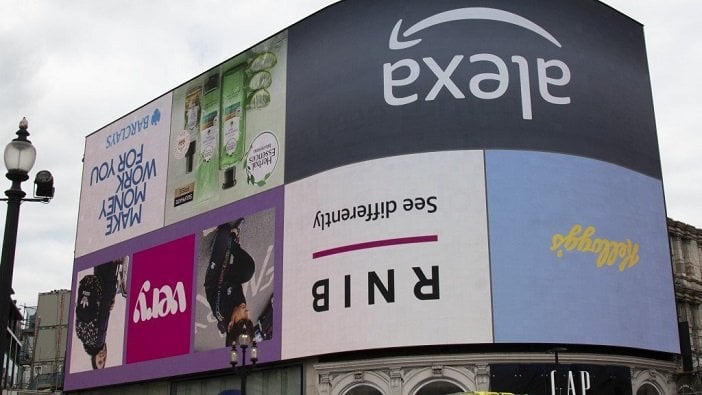World Upside Down: Educating the public about social distancing and sight loss
Social distancing relies on being able to see where others are, something that’s impossible for many people with sight loss.

We launched our World Upside Down campaign last week to increase understanding of the challenges among the public so they know how to help.
Our Piccadilly Circus stunt grabbed the attention of a lot of people
To get the attention of the public, we began our campaign on the world-famous Piccadilly Lights billboard in the heart of London, on advertising space that had been kindly gifted to us.
With the support of several household brands including LEGO, British Gas and Kelloggs, we ran an advertisement which appeared to turn all the advertising on Piccadilly Lights upside down to mirror how social distancing has turned blind and partially sighted people’s worlds upside-down. We also used social media to ask people to get involved by turning their profile, or any image, upside down to show their support for our campaign and increase awareness.
The campaign trended on Twitter, reaching millions of people online. Nearly 3,000 people used our hashtag #WorldUpsideDown. This included members of the public, businesses, MPs, and celebrities like Lord Alan Sugar and former footballer Michael Owen. This helped their millions of followers understand how people with sight loss might find social distancing difficult.
The Mayor of London added his support to the campaign:
"People with sight loss have been significantly impacted throughout lockdown. I applaud the RNIB for their new campaign to give us a different perspective on our city."
We also encouraged MPs to tweet their support for our campaign and share our quiz with their followers. Their support not only helps us reach their constituents with our messages for the public but also helps boost our work to influence Government on the campaign’s policy asks.
And we got the attention of print and broadcast media, such as the Evening Standard and ITV evening news (add DN coverage).Our very own RNIB Connect Radio interviewed our Head of Social Change, Sarah Lambert who talked about why we are campaigning on this issue. We also heard from Amazon about why it chose to support this campaign and from Rachael who shared her first-hand experience with social distancing.
Filming at the Piccadilly Lights captured the views of blind and partially sighted people and passers-by, who said the advertisement had made them think about the impact of social distancing on people with sight loss for the first time. They said they would now be more aware of how to give space to a person with a cane or guide dog.
How we will build on the campaign’s success
We’re continuing to try to increase public understanding of how difficult it can be to social distance with sight loss, and at the same time we’re working to influence the Government to make things better.
We want to reach as many people as possible with our Sight loss and social distancing quiz to improve public awareness of how social distancing impacts on the lives of blind and partially sighted people and show them how to help.
We‘re also asking the Government to better support blind and partially sighted people to social distance, including providing clear rules on guiding, and working with us to improve public understanding.
And we know that blind and partially sighted people are coming up with some innovative ways to make social distancing more accessible. So if you’ve found a way to make social distancing slightly easier, please do share it with us through our top tips page, and we’ll let other blind and partially sighted people know.
We’ll be sharing more information and ways to get involved so please stay up to date with our campaign. Your continued support makes a difference – visit our campaign homepage.







